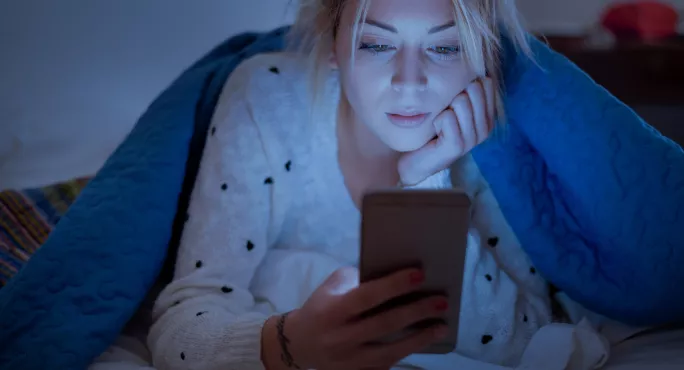- Home
- Pupil sleep problems ‘worsen as screen time increases’
Pupil sleep problems ‘worsen as screen time increases’

Almost a third of young people experience sleeping difficulties, according to a new study - a proportion that researchers say has increased from around a quarter in just four years.
A study of school-age children, carried out in 2018, found that 35 per cent reported suffering multiple health complaints weekly through sleeping difficulties, with feeling nervous and irritable among the most common.
Sleep problems among adolescents have been linked in other studies to electronic devices and social media.
Social media overuse: The struggle to get up for school
Quick read: Pupils surviving on two hours’ sleep due to ‘phone addiction’
Tired and emotional: ‘We need to teach pupils the importance of sleep’
The new 2018 Health Behaviour in School-aged Children (HBSC) study found that more than nine in 10 (92 per cent) of 15-year-olds kept their smartphones in their bedroom at night, and nearly all (95 per cent) of young people surveyed said they owned a smartphone with an internet connection.
Researchers also found that just 17 per cent of adolescents in Scotland met the current recommendation of a daily hour of moderate-to-vigorous physical activity.
Pupils suffering sleep problems
The proportion of young people playing computer games on weekdays has increased “substantially” since 2006, from 22 per cent to 42 per cent among girls and from 53 per cent to 71 per cent among boys.
The University of Glasgow’s Dr Jo Inchley, lead author of the study, said: “We’ve seen significant improvements [in reducing unhealthy behaviour] in recent years in areas such as substance use and eating behaviours.
“But at the same time, new challenges such as social media are increasingly impacting on how young people live their lives and these can have a significant impact on their wellbeing.
“This report helps us to better understand the challenges young people face and the areas where more support and investment is needed.”
The study found that 85 per cent of young people reported high life satisfaction in 2018, while almost one in five adolescents rated their health as excellent.
However, researchers found the proportion of young people reporting sleep difficulties more than once a week increased from 23 per cent in 2014 to 30 per cent in 2018.
On weekdays the average length of sleep was 8.3 hours for 13-year-olds and 7.8 hours for 15-year-olds.
The recommended sleep for teenagers is eight to 10 hours each night.
Fears for young people’s mental health
Researchers found that 37 per cent of adolescents were classified as having low mood (33 per cent of boys, 41 per cent of girls) and 14 per cent were at risk of depression (11 per cent of boys, 17 per cent of girls).
Dr Inchley said: “The declines in mental health and increase in sleep difficulties are concerning.
“There’s been a small but steady increase in the proportion of girls taking part in physical activity in their free time, but, overall, levels are still very low and screen time has been increasing at a much faster rate.”
The study surveyed 5,286 pupils in Scotland, aged 11, 13, and 15, from 208 schools.
Vigorous physical activity was found to be higher among boys than girls.
Just over a third of adolescents reported eating fruit (35 per cent) or vegetables (36 per cent) every day.
Dr Rory Mitchell, public health intelligence principal at NHS Health Scotland, which funded the study, said: “This report highlights some positive trends as well as ongoing challenges.
“The data shows that children from wealthier families tend to report better health and wellbeing than those from poorer families.
“This highlights the need for a continued focus on tackling health inequalities in Scotland.”
Dr Justin Williams, vice-chair of the child and adolescent mental health services faculty at the Royal College of Psychiatrists Scotland, said: “The increasingly rich media diet offered to our young people today often causes problems because they consume too much or consume the wrong stuff.
“It can displace family life, physical activity and even just sleep. And some young people, especially those with mental health problems, are highly vulnerable to these negative effects.
“Nevertheless, research shows time and again that affluence and supportive family environments are important sources of resilience.”
A spokesman for the Scottish Children’s Services Coalition called for more research on the issue, adding: “There is a desperate need to educate young people on how to use social media healthily and how social media promotes unrealistic expectations.”
A Scottish government spokeswoman said a £250 million package of measures to support the mental health of Scotland’s young people was underway, including an advisory group on body image for this age group, a review of evidence on the effects of screen use on adolescents’ sleep and funding for social media advice.
The investment includes training teachers in mental health first aid and having counsellors for every secondary school.
The spokeswoman added: “We want all young people to grow up in a modern Scotland with good mental wellbeing, and with support for issues that they say matter to them.”
Keep reading for just £1 per month
You've reached your limit of free articles this month. Subscribe for £1 per month for three months and get:
- Unlimited access to all Tes magazine content
- Exclusive subscriber-only stories
- Award-winning email newsletters



